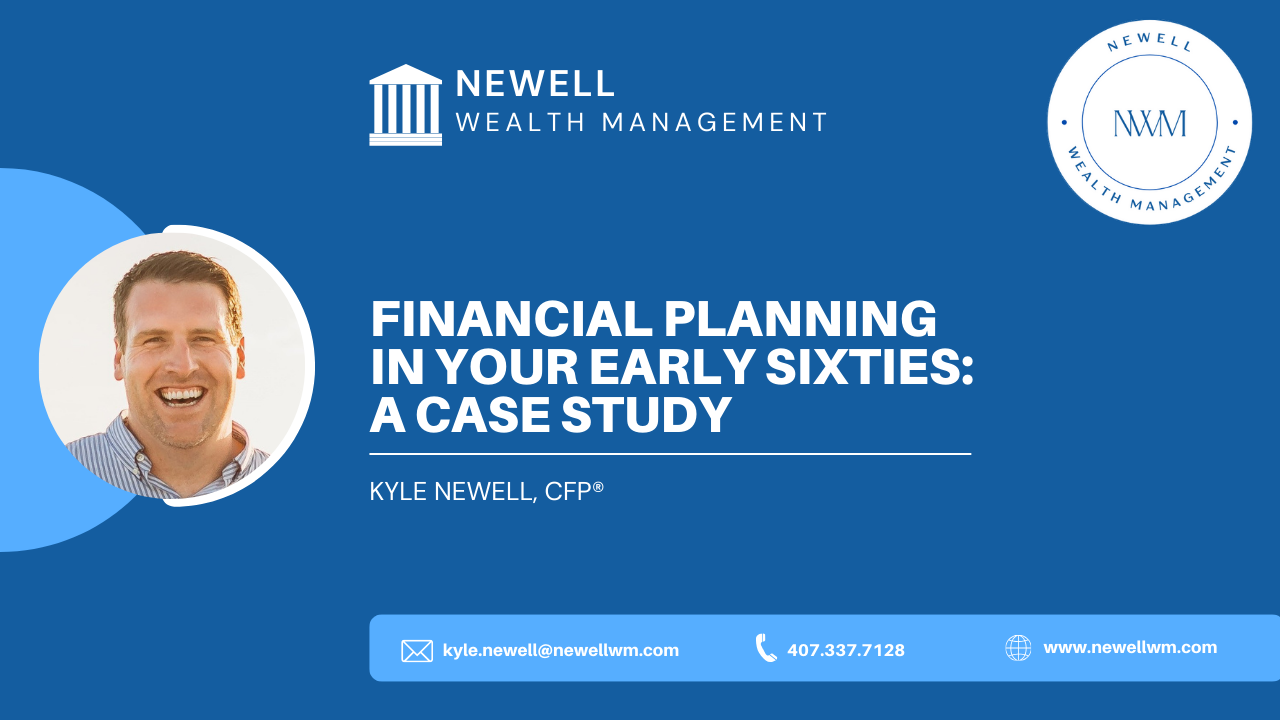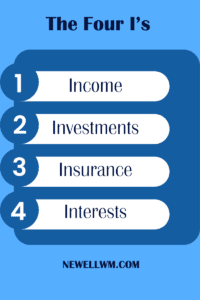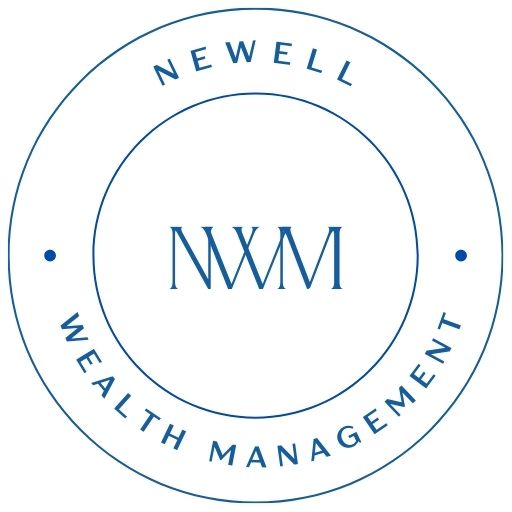Financial Planning In Your Early 60s: Case Study

Turning the page into your 60s can be a fun and contemplative time as you’re getting closer to retirement, thinking about retiring, or already retired. You may want to keep working as long as you are able. If you enjoy what you’re doing, by all means, keep doing it.
Nonetheless, there are several things to think about as you approach your early 60s and consider transitioning into retirement. I’ve worked with a lot of these types of clients. There are four I’s that I like to go over with clients approaching their early 60s and before reaching 65.

Income
First is your income. Figuring out your income plan is one of the most pivotal decisions you will make as you transition to retirement. It’s essential to feel good and confident about your income plan.
There are several components to an income plan.
Social Security
Social Security is a crucial element in almost everyone’s retirement income plan. What’s the timing of when you will take it?
- Early
- At full retirement age
- In your 70s
There are pros and cons to each of those approaches. Make sure you know how each one will affect your income.
Pension
Pensions often have options on how to claim them. With choices come questions.
- When are you going to claim your pension?
- How much will it be?
- What are the options associated with taking your pension?
Are you going to choose:
- Just for your own life
- A certain benefit period
- A joint life type of pension
If you work at Disney, there are several options for your Disney pension and choosing income options.
Investments
Often, the third component of your income plan is your savings and investments. How will they generate income for you? There are three main approaches to generating income from your portfolio.
Bucketed Approach
The bucketed approach is when you have different buckets of money for different timeframes.
- Short term
- Medium-term
- Long term
Interest Approach
This approach involves investing everything into income-producing investments. Five years ago, that wasn’t a great plan. In 2023, interest rates have come up a lot, making the interest approach a viable option to consider.
An interest approach invests your money where your principle stays intact for the most part. Your investments are generating enough interest to cover your income needs.
Broad Category Approach
A general broad category approach is a total return or endowment approach. This is when most of your money is invested in a broadly diversified portfolio. With this approach, you’ll be making more dynamic decisions around taking out income.
Sometimes, it’s interest, capital gains, or other variations. Again, there are pros and cons to each of these strategies. Understanding what your income approach will be in relation to your other sources of income is critical.
Insurance
The primary insurance concern for most people in their early 60s is healthcare-related. Health care insurance, in particular, is very worrisome because it can be expensive. It’s also somewhat of an unknown.
If you work for a company like Disney, for instance, you worked for Disney your whole life, you are used to having the company insurance plan. Once you retire, you no longer have the company insurance plan and many more decisions to make.
There are several insurance considerations, including private plans before the Medicare age. The costs of these plans vary and can be very expensive, upwards of $2,000 to $3,000 a month. You will need to spend some time evaluating what type of insurance to choose.
If you’re working for a company like Disney, you’ll have access to COBRA Insurance, which only lasts a while. If you retire in your early 60s, it will more than likely not cover you all the way to Medicare age.
There’s also the possibility to qualify for the Affordable Care Act, also known as Obamacare. The program provides credits on your premiums, depending on your income level. Several other options exist that may be less expensive but come with their own risks.
Medicare
When you reach age 65, you transition to Medicare, which has two parts.
Traditional Medicare
Traditional Medicare is covered everywhere in the U.S. There are some gaps, so you must buy additional parts of Medicare to get comprehensive coverage.
Advantage Plans
Advantage plans are more akin to a group plan rather than a Medicare one. An Advantage Plan covers most things but is primarily tied to a local area. This brings some risks as well.
Investment Strategy
Investment strategies and income are directly connected. Depending on how much income and the type of income approach you will take, your investment strategy will be a big part of it.
Some of your strategies will be based on income, but long-term goals also come into play. You want your income to be there now and down the road when needed. Don’t neglect to consider things like
- Costs of aging
- Needing more hired help
- Being unable to make financial decisions
- Leaving something for your children
- Supporting a charity
Sound investment decisions are not only tied to knowing how much income you need. You also need to understand things like
- What’s the taxation of those different types of income assets?
- How much risk are you willing or comfortable taking?
- How much risk do you need to take?
The answers to these questions impact your investment strategy. You can go from very conservative to very aggressive and everything in between. Depending on your situation, a mix may be the right idea.
Create an investment strategy and be sure to monitor it on an ongoing basis—the market changes. Your life changes. Adjust your investments accordingly.
Interests
As you’re approaching your early 60s and are closing in on retirement, consider your interests. Research and experience show that we need something to wake up for in the morning. It’s pivotal for us to have some interests that we can pursue, not only from a hobby standpoint but also from a relational standpoint.
Relationships are pivotal to success and retirement. One of the biggest things people miss when they retire is the relationships with friends and work colleagues you’ve spent your life getting to know. A clear action plan for your interests and keeping your mind sharp is pivotal when transitioning into retirement.
Remember the Four I’s
The Four I’s will help guide your thinking and decision processes as you approach your early 60s. Think about your current life and the retirement life you want to have. Consider each of these areas in your plan.

As an experienced financial planner, I’m happy to help you create the right strategy for your situation.
Important Information
Newell Wealth Management, LLC (“NWM”) is a registered investment advisor offering advisory services in the State of FL and in other jurisdictions where exempted. Registration does not imply a certain level of skill or training. The presence of this website on the Internet shall not be directly or indirectly interpreted as a solicitation of investment advisory services to persons of another jurisdiction unless otherwise permitted by statute. Follow-up or individualized responses to consumers in a particular state by NWM in the rendering of personalized investment advice for compensation shall not be made without our first complying with jurisdiction requirements or pursuant an applicable state exemption.
All written content on this site is for information purposes only and is not intended to provide specific advice or recommendations for any individual. Opinions expressed herein are solely those of NWM, unless otherwise specifically cited. Kyle Newell and NWM are neither an attorney nor an accountant, and no portion of this website content should be interpreted as legal, accounting or tax advice. Material presented is believed to be from reliable sources and no representations are made by our firm as to other parties’ informational accuracy or completeness. There is no assurance that the views or strategies discussed are suitable for all investors or will yield positive outcomes. Investment involves risks including possible loss of principal and unless otherwise stated, are not guaranteed. Any economic forecasts set forth may not develop as predicted and are subject to change. All information or ideas provided should be discussed in detail with an advisor, accountant or legal counsel prior to implementation.
